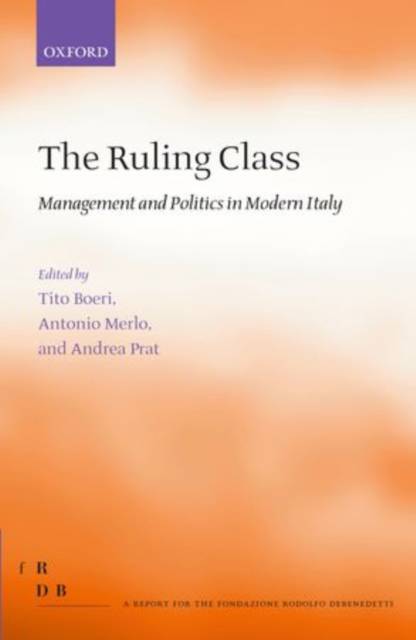
- Afhalen na 1 uur in een winkel met voorraad
- Gratis thuislevering in België vanaf € 30
- Ruim aanbod met 7 miljoen producten
- Afhalen na 1 uur in een winkel met voorraad
- Gratis thuislevering in België vanaf € 30
- Ruim aanbod met 7 miljoen producten
Zoeken
Ruling Class
Management and Politics in Modern Italy
€ 290,45
+ 580 punten
Omschrijving
The ruling class plays a major role in society. It makes possible what would otherwise be infeasible, by removing constraints that may stand in the way of long-term growth. Historically, economists devoted far less attention than sociologists to the study of ruling classes. Using the theoretical tools of economists, this volume provides an understanding of what drives the formation of a ruling class, and the relationship between politics and business firms. Focusing on Italy, it uses labour economics to analyse the selection of the ruling class, the labour market of politicians, the allocation of managers' time, and their incentives, remunerations, and career paths. It draws on contributions from two teams of leading scholars and on research undertaken by the Fondazione Rodolfo DeBenedetti.
Part I focuses on the labor market of politicians. It uses detailed information on personal characteristics, incomes, performance in office, and career paths (both before and after the Parliamentary mandate) of all the politicians elected to the Italian Lower Chamber (Camera) between 1948 and 2008. This is the first time that this information has been gathered and summarized in key indicators. Part II is devoted to the managerial class. It includes cross-country surveys of managers across a sample of European countries, surveys carried out in cooperation with the largest union of managers in the service sector, social security records, and, for the first time, surveys on the allocation of time for top executives.
Part I focuses on the labor market of politicians. It uses detailed information on personal characteristics, incomes, performance in office, and career paths (both before and after the Parliamentary mandate) of all the politicians elected to the Italian Lower Chamber (Camera) between 1948 and 2008. This is the first time that this information has been gathered and summarized in key indicators. Part II is devoted to the managerial class. It includes cross-country surveys of managers across a sample of European countries, surveys carried out in cooperation with the largest union of managers in the service sector, social security records, and, for the first time, surveys on the allocation of time for top executives.
Specificaties
Betrokkenen
- Uitgeverij:
Inhoud
- Aantal bladzijden:
- 228
- Taal:
- Engels
- Reeks:
Eigenschappen
- Productcode (EAN):
- 9780199588282
- Verschijningsdatum:
- 19/11/2010
- Uitvoering:
- Hardcover
- Formaat:
- Genaaid
- Afmetingen:
- 163 mm x 234 mm
- Gewicht:
- 517 g

Alleen bij Standaard Boekhandel
+ 580 punten op je klantenkaart van Standaard Boekhandel
Beoordelingen
We publiceren alleen reviews die voldoen aan de voorwaarden voor reviews. Bekijk onze voorwaarden voor reviews.







